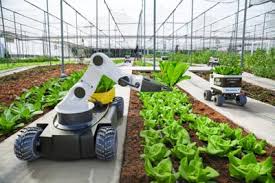Agri-Tech and Digital Farming Solutions for Farmers and Co-ops Training Course
Agri-Tech and Digital Farming Solutions for Farmers and Co-ops Training Course equips participants with in-demand skills, tools, and insights to optimize productivity, reduce input costs, and enhance crop yields through the adoption of smart farming solutions and AI-driven agri-business models.

Course Overview
Agri-Tech and Digital Farming Solutions for Farmers and Co-ops Training Course
Introduction
The rise of Agri-Tech and Digital Farming Solutions is revolutionizing traditional agriculture, enabling farmers and cooperatives to harness data-driven technologies for smarter, more sustainable, and profitable practices. As climate change, population growth, and resource scarcity reshape global food systems, there is an urgent need for precision agriculture, IoT-enabled farming, agricultural data analytics, and automation in agriculture. Agri-Tech and Digital Farming Solutions for Farmers and Co-ops Training Course equips participants with in-demand skills, tools, and insights to optimize productivity, reduce input costs, and enhance crop yields through the adoption of smart farming solutions and AI-driven agri-business models.
The course integrates real-world case studies and hands-on approaches to bridge the digital divide between tech innovation and smallholder or cooperative-led agriculture. Participants will learn to implement cloud-based farm management systems, leverage remote sensing, utilize drone mapping, and explore blockchain for supply chain traceability. The course is designed to empower both tech-savvy and traditional farmers to transition into climate-smart, digitally-enabled, and market-ready agriculture enterprises.
Course Objectives
- Understand the fundamentals of Agri-Tech ecosystems and smart agriculture platforms.
- Analyze IoT applications in farming for real-time data and efficiency.
- Explore precision agriculture tools to enhance crop planning and soil health.
- Integrate remote sensing and drone technologies for yield optimization.
- Use big data and AI analytics for informed decision-making.
- Apply blockchain in agriculture supply chains to ensure transparency.
- Assess climate-resilient digital farming practices.
- Evaluate mobile and cloud-based farm management apps.
- Implement digital financial inclusion tools for agri-cooperatives.
- Explore e-commerce and digital marketplaces for farmers.
- Learn smart irrigation and water-saving technologies.
- Promote gender-inclusive digital agri-training.
- Develop scalable Agri-Tech strategies for cooperatives and smallholders.
Target Audiences
- Smallholder Farmers
- Agricultural Cooperative Leaders
- Agri-Business Entrepreneurs
- Rural Development Officers
- Government Agricultural Extension Workers
- Agronomists & Agri-Engineers
- ICT Experts in Agriculture
- NGO Professionals in Food Security
Course Duration: 5 days
Course Modules
Module 1: Introduction to Agri-Tech Ecosystems
- Overview of digital agriculture and global trends
- Agri-Tech innovations and their impact on productivity
- Role of mobile technology in farming
- Infrastructure requirements for smart farming
- Introduction to Agri-Tech start-ups and partnerships
- Case Study: Kenya’s M-Farm mobile solution for farmers
Module 2: Precision Farming & Smart Tools
- Principles of precision agriculture
- Tools for soil mapping and fertility monitoring
- GPS and sensor-based field analysis
- Variable Rate Technology (VRT) in action
- ROI analysis for precision tech investments
- Case Study: Precision farming adoption in South Africa’s maize sector
Module 3: IoT and Sensor-Based Farming
- IoT applications in agriculture
- Real-time data collection from sensors
- Livestock monitoring systems
- Integration with cloud platforms
- Cost-benefit of IoT implementation
- Case Study: IoT-based greenhouse management in India
Module 4: Remote Sensing and Drone Tech
- Basics of satellite imagery and UAVs
- Drones for crop health and pest detection
- NDVI mapping for plant vigor
- Drone regulations and safety
- Data analysis from aerial imagery
- Case Study: Drone mapping for rice farming in the Philippines
Module 5: Agri-Data, AI & Analytics
- Data types and sources in agriculture
- Machine learning for yield prediction
- AI-driven crop disease detection
- Predictive analytics for market trends
- Dashboard creation and visualization tools
- Case Study: AI-powered forecasting in Brazilian soybean farms
Module 6: Blockchain & Digital Supply Chains
- Blockchain fundamentals in agri-business
- Traceability in food systems
- Reducing post-harvest losses with digital tracking
- Building trust with smart contracts
- Integration with e-certification bodies
- Case Study: Cocoa blockchain pilot project in Ghana
Module 7: Smart Irrigation & Climate-Smart Tech
- Irrigation sensors and moisture monitoring
- Water efficiency through automation
- Weather-based scheduling tools
- Integration with climate forecasts
- Adoption barriers and mitigation
- Case Study: Solar-powered drip irrigation in Senegal
Module 8: Digital Marketplaces & Agri-Fintech
- Platforms for digital trading of farm produce
- Access to digital credit and insurance
- Mobile wallets and e-payments in agri-commerce
- Fintech for cooperative capital access
- Success metrics for online platforms
- Case Study: Twiga Foods' digital logistics network in East Africa
Training Methodology
- Interactive workshops and expert-led webinars
- Practical demonstrations with digital tools
- Group projects and peer learning exercises
- Real-time simulations and mobile app walkthroughs
- Field videos and case study analysis
- Post-training mentorship and resource support
Register as a group from 3 participants for a Discount
Send us an email: [email protected] or call +254724527104
Certification
Upon successful completion of this training, participants will be issued with a globally- recognized certificate.
Tailor-Made Course
We also offer tailor-made courses based on your needs.
Key Notes
a. The participant must be conversant with English.
b. Upon completion of training the participant will be issued with an Authorized Training Certificate
c. Course duration is flexible and the contents can be modified to fit any number of days.
d. The course fee includes facilitation training materials, 2 coffee breaks, buffet lunch and A Certificate upon successful completion of Training.
e. One-year post-training support Consultation and Coaching provided after the course.
f. Payment should be done at least a week before commence of the training, to DATASTAT CONSULTANCY LTD account, as indicated in the invoice so as to enable us prepare better for you.